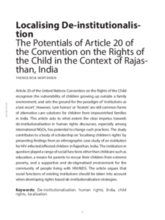Article 20 of the United Nations Convention on the Rights of the Child recognises the vulnerability of children growing up outside a family environment, and sets the ground for the paradigm of ‘institutions as a last resort’. However, ‘care homes’ or ‘hostels’ are still common forms of alternative care solutions for children from impoverished families in India. This article asks to what extent the clear impetus towards de-institutionalisation in human rights discourses, especially among international NGOs, has potential to change such practices. The study contributes to a body of scholarship on ‘localising children’s rights’ by presenting findings from an ethnographic case study of an institution for HIV-infected/affected children in Rajasthan, India. The institution in question played a range of social functions other than childcare such as education, a means for parents to rescue their children from extreme poverty, and a supportive and de-stigmatised environment for the community of people living with HIV/AIDS. The article argues that social functions of existing institutions should be taken into account when developing rights-based de-institutionalisation strategies.

